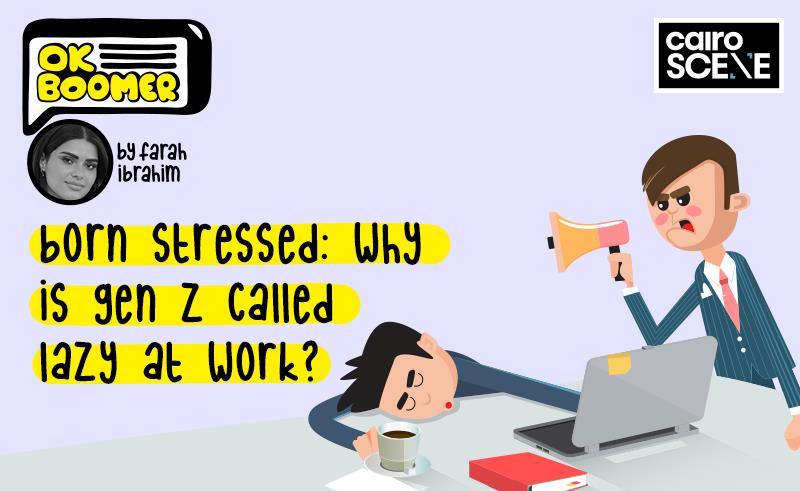OK Boomer: Why is Gen Z Called Lazy at Work?
Is it depression, is it leftism, or is it the pandemic?

Are you too stressed to be productive? Or are you not stressed enough? My entire life, I always thought that I was someone who performed best under pressure. As a student, I was a serial procrastinator. Even for my International Baccalaureate exams, which my school had spent two years preparing me for, I only began studying two days prior when the anxiety started setting in. Yet somehow I always did well. Without the looming threat of failure, there wasn’t much to motivate me. Is it living on the edge or just laziness? Probably the latter.
Now, eight years out of high school, I’m slowly starting to realise I was just acting like a teenager. Careless. Nowadays, I ask myself how I can get more work done in a day. I often do a time-box practice where I allocate a certain amount of time to each item on my to-do list; i.e ‘by 3 pm I will have written two more articles’. It always works— I even end up finishing early. So it wasn’t laziness after all, it seems. I think that now, just shy of 26-years-old, I’ve finally started to learn how to be self-motivated despite having no grades, no exams, and not even a disapproving teacher’s stare hanging over my head.
The reality is, I always assumed that more work = more stress. It’s a necessary evil, and you can’t choose to work hard and live without stress at the same time. It’s a package deal; it’s simply the price you pay because work is not fun. Well, I was wrong, and science can help explain why.
According to what is known as “The Yerkes-Dodson law,” performance increases with physiological or mental arousal (stress) but only up to a point. When the level of stress becomes too high, performance decreases. Let’s say you have a deadline at 6 pm; by 4 pm your productivity is likely to start peaking because it’s crunch time. But if you have a manager yelling over your head, that productivity is going to start going down, because now you’re panicking. You need to be challenged, but not overwhelmed. As the renowned scientist Hans Selye once put it, “Stress is not necessarily bad for you, it is also the spice of life.” But as with any spice, it should be used sparingly.
A study from the University of Thessaly says that increased stress leads to reduced productivity and increased satisfaction leads to increased productivity. When work begins to overlap with workers' personal life this implies a negative effect on productivity. Quality work is more related to conscientiousness and personal satisfaction than work load. See what I’m getting at? If you’re spending a bulk of time worrying about work, then that will drain your mental energy. On the flip side, a small sense of urgency to finish a certain task will motivate you positively, without overwhelming you. A red line needs to be drawn between motivation and stress.
The issue is that everyone is different when it comes to the stress curve. Some of us don't require a lot of stress to become motivated, while others do. When faced with too much stress, some of us crumble, while others thrive.
Lots of employers may not see it that way, but in reality stress can cause real issues for businesses. When an employee feels overwhelmed and unable to cope, organisations might experience an increase in absenteeism. They might also experience high turnover rates they can’t keep up with. Many people feel that their job or education is one of the most stressful things in their life, so it naturally begs the question: just how much time and money are lost due to workplace stress and compromised productivity?
Apparently, a lot. And not to blame everything on the pandemic– stress is a tale as old as time– but there’s no denying it’s gotten worse following COVID-19. Over the past 24 hours, a Google search found almost 1.1 million references to stress in the news. Teachers are resigning from their positions as a result of their stress. Families are stressed over their children going to school, but they’re also stressed about them staying home. COVID counselling lines are being established literally everywhere. Countless articles document ways to reduce stress. There are even articles on how to protect our pets from pandemic-related stress.
The stress-productivity shortfall is being fueled by turnover, absenteeism, disengagement, unhappiness, loss of innovation, decreased resilience and inability to focus at work, and the rates of which have undeniably skyrocketed since March 2020. And since the youngest in the workforce are Gen Z employees fresh out of university, it’s no wonder their debut into the market is laced with a deep-seeded sense of dread. They don’t remember a time where work did not equate to undue stress, and Millenials don’t remember a time when they weren’t poor. No wonder Stressed Out by Twenty One Pilots is the anthem of our generation.
So what of it then? The pandemic seems to drag on and on, and we even have a new Russian war to thank for yet another economic crisis. I would love to say that life’s great, the planet isn’t dying, and we don’t live in capitalism. The reality is that’s a lie, so the show must go on with or without the stressors at hand. We have to make a living. Ew.
According to Forbes’ Expert Panel, there are ways to cheat the system and boost your productivity while reducing stress. And yes, some of them are cliche things like ‘practice mindfulness’, but others are actually worth a shot. One in particular caught my attention because it involves cheating— so naturally I feel compelled to try it. This tip from the panel asks you to go on the internet and scour it for absolutely all the tech tools that can simplify your life. Schedulers, email filters, paraphrasing tools, you name it. Do everything in your power to make your life easier. Work smarter, not harder. Whoever coined ‘if you want something done right, do it yourself’ is one annoying jackass. We don’t need that negative energy.
Another tip recommends ‘focusing on your sweet spot’. It sounds wrong, but bear with me. What about your job or studies do you like the most? What part are you most passionate about? Nurture that part of your work, and maybe you’ll even get paid to do it exclusively, to teach it to others, or you can get recruited somewhere else for that very skillset.
Finally, one of the most practical tips is to remove that pressure on ‘avoiding stress’. No such thing exists. Stress exists and you will inevitably feel it closing in on you.You don’t live under a rock. Instead, focus on recovery. Take some days to prioritise recovery the way you would your to-do list. A few times a week, commit to sleeping early. Take your lunch break outdoors, go for a walk. You probably won’t come back to the office completely unafraid of your long task list, but you may just feel a little lighter and more ready to tackle it head-on.
As I grow older and I’m exposed to different work structures, I’m coming to realise more and more that work doesn’t actually have to be hard. Working hard is one thing, but feeling like it’s hard is another. Urgency is good, so is initiative and discipline, but those are things that come from within. They need to be nurtured. Once you feel as though your reasons for working hard are coming from an outside force, you need to stop and reassess— what am I here to accomplish?
- Previous Article Dr.Sisilove or How (Not) To Diffuse A Bomb
- Next Article Molotof Remixes Fairuz In Latest Single 'Free Palestine'
Trending This Week
-
Apr 23, 2024
























